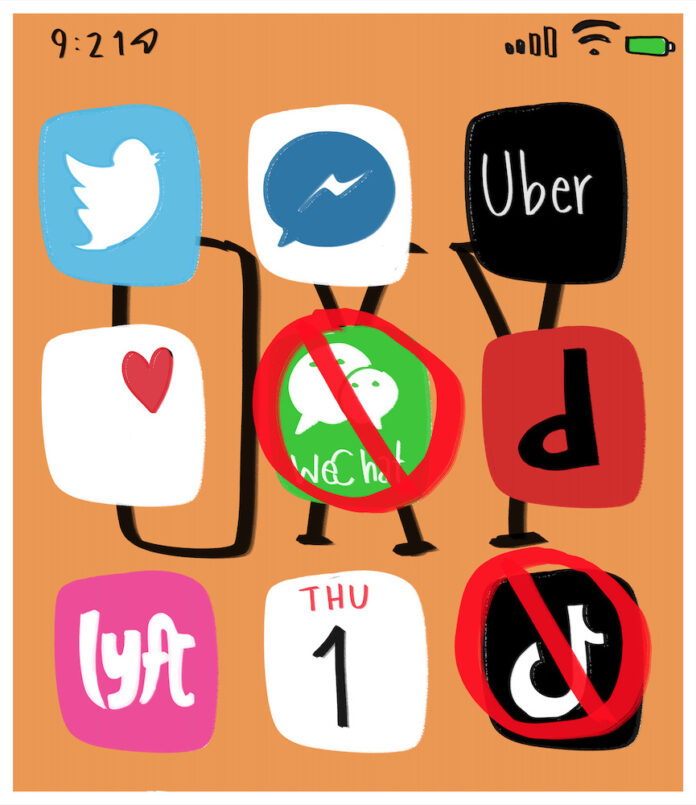A few days after the White House announced the executive order to ban WeChat Aug. 6, my grandpa called me at midnight Los Angeles time. I missed the call, and he followed up with a voice message asking me if it was true that WeChat would be banned in the U.S. and that I would no longer be able to chat with him over it. Then my parents called and asked if they should download Zoom so we could continue to video call every week. I suggested nothing.
When I started working on this article, I reflected on and became disturbed about my initial detachment from this news.
WeChat, a multifunctional all-in-one superapp with 3.3 million active users in the U.S. and 1.2 billion worldwide, is a necessity for many. More than 90 percent of people living in first-tier cities — Beijing, Shanghai, Guangzhou and Shenzhen — are registered users. In the U.S. WeChat is utilized mostly by members of the Chinese diaspora. It’s the platform that connects these immigrants to their overseas families and each other.
Along with social media functions, WeChat offers banking, gaming, food delivery, transportation, pet grooming and innumerable third-party services. WeChat has a cleaner interface than Facebook, is less self-indulgent than Instagram and is more private than both because everything that appears on your feed — which WeChat calls Moments — is strictly limited to your added friends with little to no interruption by ads. It’s the only social app on my phone that exists outside of my folder of social apps.
It’s the app I wake up to, checking if my grandparents or cousins have posted anything interesting in the family group chat, and go to bed with, reading articles or poetry from my favorite subscription accounts. I barely post on Moments anymore, but I still check it regularly to see what my peers are up to and connect with people from days of yore. WeChat is a life staple.
When I entered high school, I quickly found myself embroiled in a world connected via WeChat. At my first club fair in ninth grade, every club I signed up for asked me to either add them individually or join a WeChat group for announcements and scheduling. There was a WeChat group for my home class, where the teacher answered questions and posted school announcements every day in the morning. School events were marketed primarily on WeChat. What was once a platform used out of boredom or curiosity became a necessity.
The more ambitious and tech-savvy clubs registered for an official account — a subscription-based, blog-like function which are the basis of a form of grassroots journalism called self-media. These self-media accounts represented to me the new frontier of radical personal expression and a generative public sphere. From personal narratives to educational articles to activism, WeChat exposed me to worlds and knowledge I could never otherwise have gotten from school or family.
Increasing online censorship by the Chinese government has led to the disappearance of many WeChat accounts — even popular accounts with large followings. It’s not unusual to click on a viral article and find a red warning sign saying the content has been blocked for discussing “sensitive information.” In 2018, a sweeping online censorship campaign cracked down on two beloved accounts: Feminist Voices and News Lab. I graduated from high school in 2018 and left for America, where I didn’t need WeChat as my primary source of information. I was increasingly frustrated with the censorship, and I reduced my usage of the app.
However, it was never my intention to rid myself of WeChat completely. It never occurred to me that I could. Having stayed in my Berkus dorm room rather than flying back home as usual over summer, I have taken up the habit of taking pictures of my food and sharing them in my family group chat almost religiously. My dad always sends pictures of his meals in response, proudly displaying his experimentation in the kitchen. I used to deride those who take pictures of every meal they have, but I suddenly feel like eating meals and sharing them virtually are the only things maintaining my sense of routine and stability. Every time I click on the app, I know for sure I will see responses for even the most boring pictures.
The reason I was not disturbed at the initial announcement of the ban was not that I grew disillusioned with WeChat, that I no longer use it or that I have found alternative platforms for expression and connection. On the contrary, it was because WeChat is so important that it is preposterous to talk or think about it not being there anymore. Saying WeChat will be banned is like suggesting that air will not exist or the ground will disappear. How can you be disturbed by something that intuition and reason prohibit?
Despite the many serious flaws of WeChat, its significance for me and many members of the Chinese-American community is undeniable. I have to acknowledge its role in bridging my family and myself together and grounding me to my roots. Speaking of which, I’m going to go call my parents on WeChat now — while I still can.
![]()































